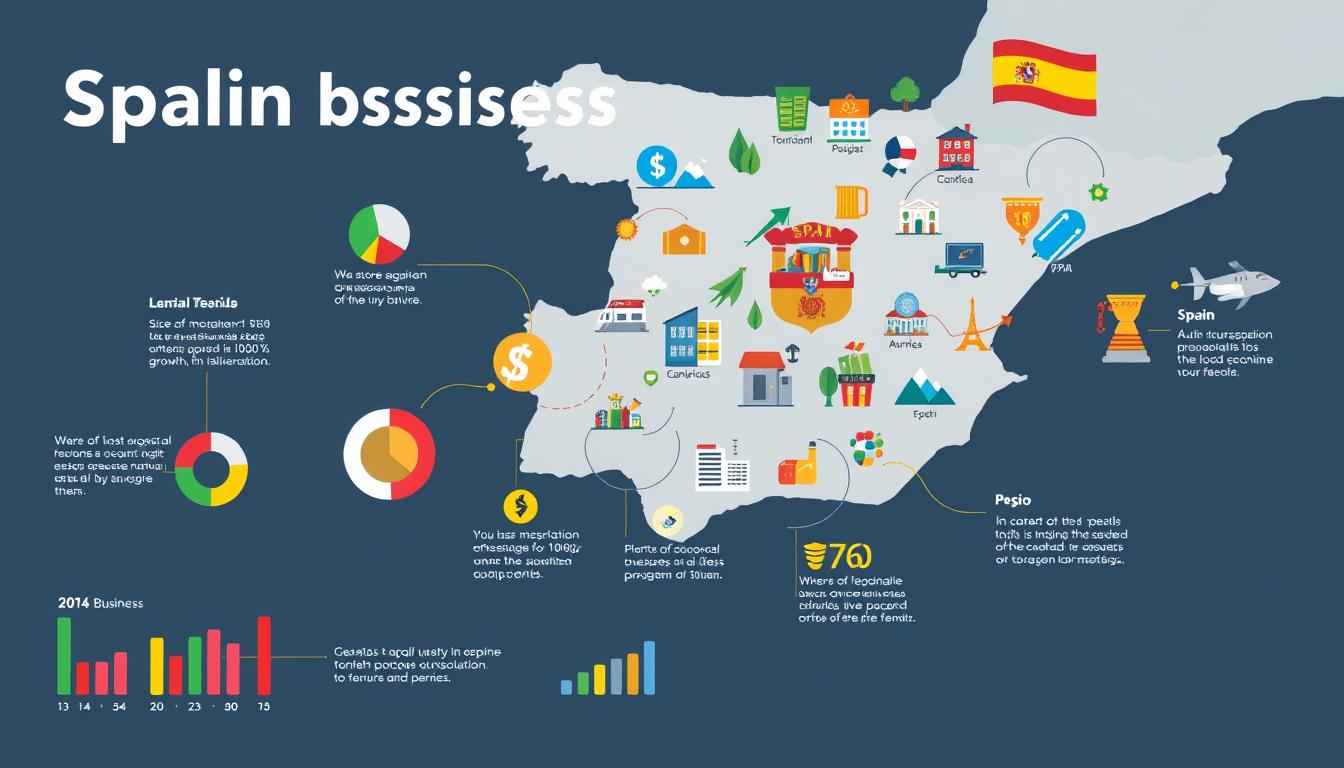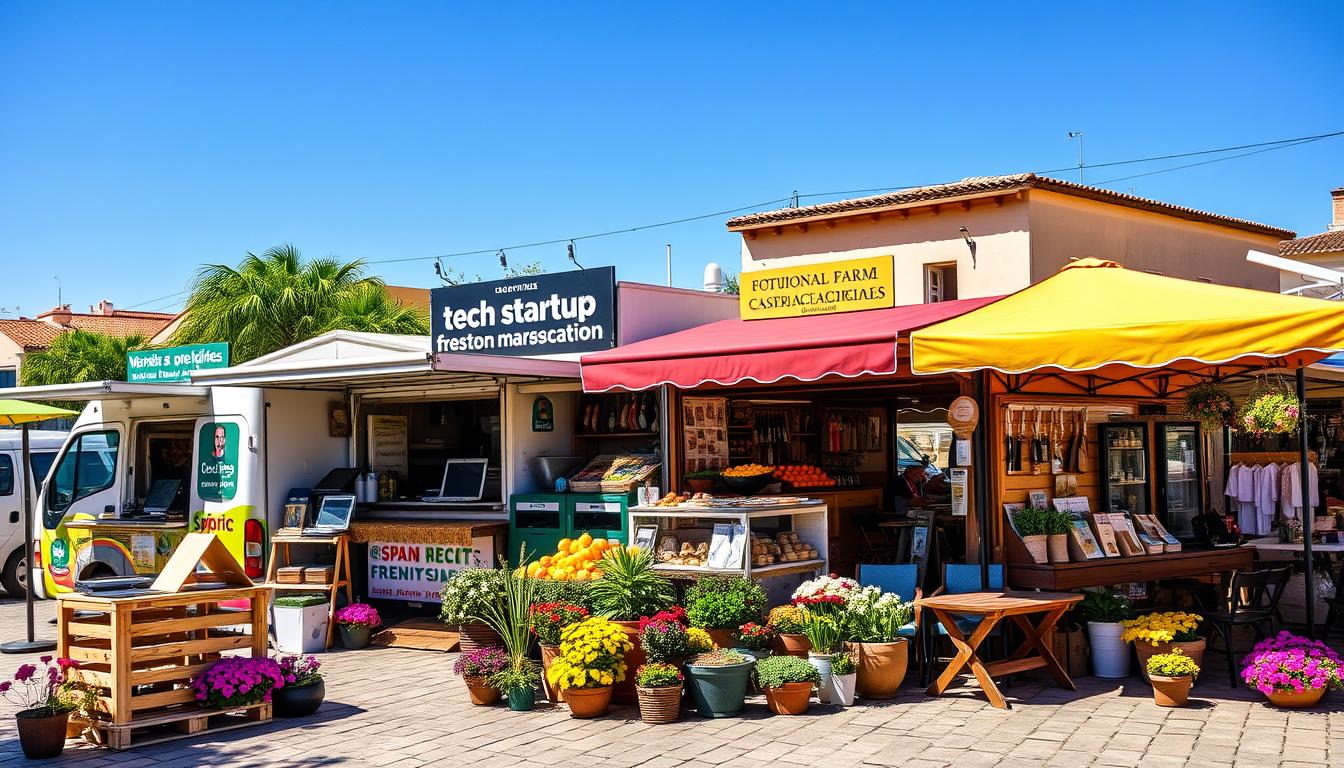Spain
Expanding your business overseas opens up new opportunities. Spain is a prime example, with its large economy and easy business environment. It’s the 15th biggest economy worldwide and the 4th in the Eurozone.
Spain is also known for being easy to do business in. It has a huge market with over 440 million consumers in the EU Single Market. This makes it easy to move goods, services, capital, and people around.
At LerriHost, we see the great chance Spanish business offers for UK companies. We help you every step of the way, from setting up to marketing. Our services make entering the Spanish market smooth.
Let’s explore Spain’s good market and high standard of living together. This will help your business grow internationally. We’re here to guide you through this exciting market.
Understanding the Spanish Market
Spain’s market is lively and offers a great quality of life. This draws many startups and big businesses. To succeed, we need a detailed Spanish market analysis to tackle the business trends in Spain. Let’s explore these areas to find market chances and cultural factors.
Market Trends and Opportunities
Spain is now a prime spot for businesses, thanks to its strong economy. In 2024, the GDP grew by 3.5%, beating expectations. Also, about 94 million people visited Spain, boosting the economy.
Yet, the Spanish market analysis shows that only 59,000 jobs went to Spanish people. This means a big chance for foreign jobs and investments.
Tourism is a big sector, adding about 13% to the GDP. The tech sector is also growing, opening doors for startups. Despite high public debt, EU funds worth €140 billion (£116 billion) helped the economy.
Cultural Considerations
It’s key to include cultural impacts in our business strategy for Spain. Knowing Spanish is vital for businesses. Also, understanding local customs, like valuing personal relationships, is important for success.
Spaniards prefer a relaxed business style, focusing on trust and long-term relationships. Knowing about Spanish holidays and adjusting business plans can help too.
Our team has the knowledge to help businesses navigate these cultural aspects. This way, companies can fit well into the Spanish market, taking advantage of its many opportunities.
Key Benefits of Expanding to Spain
Expanding your business to Spain brings big advantages. Its strong economy and key location make it perfect for reaching more European markets. This leads to big returns and many growth chances.
Access to the European Union
One major plus of moving to Spain is EU market access. Spain is the third-biggest investment market in the EU, showing a strong economy. This makes Spain a top choice for companies wanting to grow and reach more customers.
Over 13,000 foreign companies are already in Spain. This shows many businesses see the benefits here. Spain’s economy is also growing, making it a stable place for business.
Diversification of Markets
Diversifying markets is key to reducing risks and increasing profits. Spain is great for this with its lively economy and various sectors. By entering Spain, businesses can reach different economic areas and benefit from the country’s positive trends.
Spain is a top spot for foreign direct investments (FDI), showing its economic appeal. It’s the second-biggest FDI receiver in the EU, drawing in a lot of foreign money. The Spanish stock market also offers strong annual returns, making it a good long-term choice.
With LerriHost’s help, your business can make the most of Spain’s economic benefits. We guide you through local rules and cultural differences for smooth market entry.
Legal Requirements for Business Expansion
Expanding a business to Spain means dealing with legal complexities and following local rules. Knowing business laws in Spain is key for a smooth move. Our guide will help you understand the important steps and rules for a successful business in Spain.
Company Registration Processes
In Spain, registering a company depends on the type of business. For example, a limited liability company (S.L.) needs €3,000 in capital. On the other hand, a stock corporation (sociedad anónima) requires €60,000. First, you must reserve a company name with the Spanish Commercial Registry, which takes up to 48 hours.
Then, you need a Número de Identificación de Extranjero (NIE). EU citizens usually get this in 5 working days. Non-EU citizens may face longer waits. After that, a notary signs the incorporation deed in 1-3 days. Registering your company with the Spanish Register of Limited Companies (RMC) takes about 15 days.
Tax Obligations in Spain
It’s vital to understand Spanish taxes to avoid penalties. Corporations pay a corporate income tax (C.I.T.) of 25% on profits. New companies can get a 15% rate. Companies must also register for Value Added Tax (V.A.T.), which is 21%, but some goods have lower rates.
Registering with the Local Government Tax Authority takes about 2 hours. You also need a Tax Identification Number (CIF) and must follow social security rules. These include about 30% of an employee’s salary, plus employer contributions.
To learn more about the differences between a branch and a subsidiary in Spain, check our in-depth article.
Finding the Right Location in Spain
Choosing the right location is key to business success. Spain’s economy and infrastructure make it great for business growth. Let’s look at the best cities for business and how regional development helps.
Top Spanish Cities for Business
Madrid and Barcelona are top for business in Spain. Madrid is the financial heart, with many big companies and a good transport system. It’s close to Europe and has a skilled workforce.
Barcelona is known for innovation and tech. Its location on the Mediterranean boosts trade in fashion, design, and more. It’s also great for startups, thanks to accelerators and incubators.
Valencia and Seville are also growing, with lower costs and more talent. The right location depends on your business needs, workforce, and logistics.
Regional Economic Development
Spain’s growth varies by region, with different opportunities for businesses. Metro areas like Madrid and Barcelona are strong, but other regions are growing too. The Basque Country is known for manufacturing, while Andalusia excels in agriculture and renewable energy.
Public and private investments boost regional growth. Spain offers a good business climate, with competitive taxes and quick registration. Knowing these regional strengths helps businesses grow in the right places.
Creating a Business Plan for Spain
Creating a detailed business plan for Spain is key to success. A good plan helps you understand the Spanish market and financial scene. It also sets achievable goals.
Market Research Strategies
Market research is a critical part of planning in Spain. You need to know the local market, consumer habits, and who your competitors are. Use surveys, focus groups, and competitor analysis to get insights.
Also, use Spain’s national statistics, industry reports, and local directories. These can help deepen your market research.
Financial Projections
Financial planning means making detailed financial forecasts. First, figure out how much money you need. For example, a Sociedad anónima (S.A.) needs 60,000 euros, but a Limited Liability Company only needs 1 euro.
Remember to include taxes like the 25% corporate income tax and 21% VAT. Also, don’t forget social security contributions, which are 29.9% for employees.
Good financial forecasts help you plan funding and costs. Include profit and loss forecasts, cash flow statements, and balance sheets for the first years. This way, you’re ready for Spain’s economic challenges.
Establishing a Local Presence
Choosing between setting up subsidiaries or a branch office in Spain is key for a business. This choice affects how we operate, our finances, and our legal standing. It’s important to think about both the big picture and the practical side.
Choosing Between a Subsidiary or Branch
Setting up subsidiaries in Spain means having a separate legal entity. This could bring tax benefits and protect against risks. On the other hand, a branch is cheaper to start but shares the parent company’s name.
Both options have their pros and cons. It’s vital to pick the one that fits our business goals. Getting advice from experts like LerriHost can help make this important choice.
Finding Local Partnerships
Building strong partnerships in Spain is also key for entering the market. Local partners can help us understand the rules and culture. They are essential for success.
To find these partners, we need to do our research, network, and use our industry contacts. Many British companies have found success with these partnerships. A recent report highlights the benefits and challenges of expanding into Spain. A strong network helps us operate smoothly and grow our brand.
Navigating Spanish Labour Laws
It’s vital to know and follow Spanish employment laws to succeed in Spain. Your business must stick to local laws, from hiring to respecting worker rights. Let’s explore the main points of recruiting in Spain and worker rights in Spain.
Recruitment and Employment Regulations
In Spain, there are strict rules for hiring. The minimum wage for 2024 is €15,876 a year for full-time work. Workers are allowed 40 hours of work a week, with a limit of 80 hours of overtime a year.
Starting in 2025, the workweek will drop to 37.5 hours. This is the first time the workweek has been reduced in 40 years. Also, new rules for severance pay are being considered to help long-term employees, but they’re not approved yet.
When hiring in Spain, you must follow Royal Decree 1382/1985 for top jobs. Non-competition and mobility clauses need careful review. Collective Bargaining Agreements also play a big role in how you run your business. You must manage payroll correctly, including salaries and Social Security registrations.
Understanding Worker Rights
In Spain, worker rights are key, and employers must respect them. Workers get 30 days of paid holiday a year. The government plans to raise the minimum wage by 5% by 2025, showing its commitment to workers.
The Solidarity Tax hits workers earning over €59,034 a year. It only taxes the amount above this, with rates going up from 0.92% in 2025 to 7.00% by 2045. The Minimum Contribution Rate (MCR) will also go up, from 0.6% in 2023 to 1.2% by 2029.
It’s also important to have equality and harassment policies. You can appeal labour sanctions under labour laws. There’s help for illegal worker transfers, and advisors are ready to assist within 24 hours to help understand worker rights in Spain.
Financial Considerations for Expansion
Expanding a business into Spain comes with many financial challenges. Spain’s economy is growing fast, at 3.2% in 2024. This growth is higher than the eurozone and the US. It’s important to set up a business bank account and manage currency risks well.
Setting up a Business Bank Account
One of the first steps is to open a business bank account in Spain. Companies like LerriHost offer banking solutions for international businesses. This makes the process easier.
Having a business bank account in Spain has many benefits. It helps with smooth transactions and access to local financial services. With Spain’s strong economy, including low unemployment and higher wages, it’s a great place for businesses to grow.
Currency Exchange and Risks
Managing currency exchange risks is also key. Spain’s strong economy makes it appealing. But, currency rates can change a lot. Using strategies like forward contracts or currency hedging can help protect your business.
Companies like MAPFRE have done well in Spain, handling big claims. It’s important to have secure and efficient financial practices. Good business banking and currency risk management are essential for success.
Marketing Your Business in Spain
Effective marketing in Spain can really boost your business’s visibility. It’s key to understand and use these strategies well. Tailoring your marketing and using social media can make a big difference.
Tailoring Marketing Strategies
Marketing in Spain needs to fit the local culture and tastes. This means adapting your messages and visuals to connect with Spanish people. Using local languages and cultural references in your marketing can help a lot.
Also, research shows that most growth in Spanish businesses comes from a strong entrepreneurial ecosystem. So, localising your marketing not only attracts local customers but also fits with the market’s trends. This leads to better engagement and sales.
Utilising Social Media Platforms
Social media is a key tool for businesses looking to grow in Spain. Sites like Facebook, Instagram, and Twitter are big hits with Spanish users. Instagram is a favourite among the young. By creating targeted social media campaigns, you can reach a wide audience in a fun and interactive way.
- Facebook: Great for reaching lots of people and building communities.
- Instagram: Best for visually appealing content that appeals to the young.
- Twitter: Good for quick, real-time conversations and keeping up with trends.
Using social media in your marketing plan can keep you ahead in Spain’s digital market. It lets you talk to customers in real-time, answer questions fast, and build a loyal fan base.
Working with services like LerriHost can also boost your brand’s online presence in Spain. They offer SEO, WordPress hosting, and more. These services are key to success in the Spanish market.
Developing a Sales Strategy for Spain
Understanding local consumer behaviour is key for sales planning in Spain. The Spanish market has its own unique traits. These demand a deep dive into consumer preferences and buying habits.
Understanding Consumer Behaviour
Consumer behaviour in Spain is shaped by culture and economy. For example, tech is booming in cities like Barcelona and Madrid. Over 140 tech hubs in Barcelona alone have created 26,000 jobs.
This shows a market that loves innovation and digital solutions. Our analysis must focus on tech-driven products and services.
Pricing Strategies
Effective pricing is essential for success in Spain. Madrid’s GDP has grown by 23.24% to €261.7 billion by 2023. This shows strong purchasing power.
Our pricing models must reflect this economic reality and what consumers expect. Cities like Barcelona, with its wealthy consumers and fashion and sports industries, need specific pricing strategies.
In short, successful sales planning in Spain needs a deep understanding of consumer behaviour and smart pricing. By focusing on these, businesses can grow their market presence and sales.
Building Relationships with Spanish Clients
Building strong client relations in Spain needs a smart plan for networking and customer service. The Spanish Chamber of Commerce in the UK has over 100 years of helping with trade and investment between Spain and the UK. They offer great services and events that help companies grow in Spain.
Networking Opportunities
Networking in Spain is key for building strong business ties. The Chamber hosts many networking events. These are great for making strategic partnerships.
Events like the Elevator Pitch and Spanish Tapas Tour are top chances to meet corporate clients and new customers. Taking part in these events has helped create important business connections. It also boosts visibility in the British-Spanish business world.
Customer Service Expectations
It’s vital to meet customer service standards when dealing with Spanish clients. They like personal service and quick responses. By matching our service with these needs, we build trust and loyalty.
The Chamber helps businesses meet these standards with insights and resources. This is very important in sectors like hospitality. Here, keeping good customer service is key for lasting success.
Leveraging Government Support
When we expand our business to Spain, knowing about available support is key. The Spanish government and trade offices offer a lot of help. This can make our move smoother.
Incentives for Foreign Investors
Spain’s government incentives are big draws for foreign investors. They have €17,867,565.6 to support economic growth, mainly in Catalonia. Catalonia is a big player, making up 19% of Spain’s GDP and having over 625,000 small businesses.
There’s also €1 billion to help small businesses through tough times. Government grants are available for certain sectors or businesses with social goals. This makes them a great funding option.
Government incentives in Spain include tax breaks, less red tape, and financial help. Getting these grants and loans can be tough, but the benefits are huge, mainly for tech businesses.
Resources from Trade Offices
Using trade resources from the UK to Spain is also smart. Trade offices give us important info, local connections, and help getting into the market. These tools are vital for understanding the rules and building a strong local base.
E-commerce and digital marketing have opened new doors for entrepreneurs. We can find business ideas and keep up with market trends on platforms like 30countries. They share insights on business ideas that grow with the economy, tech, tourism, and green initiatives.
By combining government incentives in Spain and trade resources from the UK, we can really help our business grow in Spain. Using these resources well can increase our success and help the local economy.
Adapting Your Product or Service for the Spanish Market
To succeed in Spain, businesses need to change their products and use brand localisation strategies. Spain has about 47 million people, making it a big chance for global brands. Also, 25% of Spaniards use social media, so digital changes are key.
Modifying Offerings
Changing products for Spain means making them fit local tastes and rules. For example, food might need different ingredients. Also, following Spanish standards helps products enter the market easily.
- About 80% of Spanish people like to talk to brands in their own language, showing the need for localisation.
- Brands that localise can see sales go up by 1.5 times compared to those that don’t.
It’s important to keep the product’s quality and usefulness while making local changes. This way, the brand stays true, building trust and loyalty with Spanish customers.
Localising Your Brand
Brand localisation is key to being strong in Spain. It’s not just about translating but also making marketing fit the culture. Research shows brands that keep their message the same across all channels see a 23% boost in loyalty.
- Localised marketing can make engagement rates go up by 50% with Spanish audiences.
- In 2021, 70% of businesses saw big improvements in their campaigns thanks to cultural fitting.
Also, local video content is very important. By 2025, 82% of internet traffic will be video, showing the need for content that fits the culture.
Investing in translation and localisation can really help sales. Translation services can work fast, in 24-48 hours. This means marketing can change quickly. Also, localising can make customers happier and bring more website visitors.
In short, making products fit for Spain and using good brand localisation strategies are vital for success. By understanding and respecting local language and culture, companies can build strong connections with Spanish people, leading to lasting success.
Understanding Competition in Spain
Before you enter the Spanish market, it’s key to do a deep competitive analysis. Knowing the main players and how to stand out is vital. Spain’s growing economy and competitive job market make it a great place to expand your business.
Key Competitors to Watch
The Spanish market is full of life, with many different competitors. In the startup world, Barcelona and Madrid are top spots, with Catalonia leading with over 2,285 startups in 2024. Big names like Telefónica and Santander dominate in telecoms and banking. It’s also important to know that most Spanish people prefer local brands over international ones.
Market Entry Strategies
Planning your market entry well is essential for success in Spain. Strategies like forming partnerships can be smart; McDonald’s did well in India by partnering with a local company. With Spain’s corporate tax at 25%, managing your finances carefully is important.
Using digital marketing, which is growing fast, can also give you an edge. Make sure your products fit what locals like and use tools like ATS to make hiring easier and follow local laws.
Measuring Success in the Spanish Market
Expanding into Spain requires accurate success measurement. The country’s strong consumer power and early tech adoption are key. Yet, strict labour laws and a competitive market pose challenges. Using the right business metrics can help us succeed.
Key Performance Indicators (KPIs)
Tracking KPIs is vital for our progress and decision-making. In Spain, important KPIs include:
- Sales Revenue
- Market Share
- Customer Acquisition Cost
- Customer Retention Rate
- Net Promoter Score
These KPIs help us measure our success and find areas for betterment. LerriHost can assist in setting up these KPIs and refining our strategies. Keeping up with consumer trends and adapting to new demands, like online food delivery, is also critical.
Continuous Improvement Strategies
Continuous improvement is essential for staying ahead. By regularly reviewing our metrics, we can spot and fill gaps. Strategies for improvement in Spain might include:
- Regular customer feedback
- Employee training and development
- Boosting our digital presence and social media use
- Using advanced tech for better operations
A recent report shows that localisation and tech upgrades lead to success. For example, Spain’s fast food market is expected to grow due to changing tastes and a desire for convenience. This shows the importance of being adaptable and continually improving our strategies.
Next Steps: Taking Action
As we near the end of our business expansion plans, setting a realistic business expansion timeline is key. This ensures each phase is well-planned and executed. Clear milestones and deadlines help us track progress and make quick adjustments.
In Spain, the BNPL market is growing fast, with a 19.5% CAGR from 2021 to 2024. This shows the need for precise timing and strategic planning.
Setting Timelines for Expansion
Our first step is to create a detailed timeline. It should cover everything from getting a NIE to joining local e-commerce platforms like Aplazame and Sequra. Spain’s complex regulations, including the EU’s CCD2 by 2026, require careful planning.
Company registration in Spain can take up to 15 days. Social Security registration adds another 2 to 6 weeks. By planning these steps, we avoid delays and make our expansion smoother.
Finalising Our Expansion Plan
The final step is to finalise our business strategies. We need to document every detail, from market entry to networking. Understanding Spain’s business culture, which values personal relationships and trust, is essential for success.
Using over 75 KPIs for Spain’s BNPL market will help us measure our success. This way, we can always improve.
Working with LerriHost, we can plan and execute each phase carefully. This ensures a successful market entry and growth in Spain. For more on Spain’s business culture, read this article to learn about formal and informal interactions, respect for hierarchy, and regional differences.

Pros and Cons of Expanding Your Business to Spain
Explore the advantages and pitfalls of taking your enterprise to Spain with our detailed analysis of the potential gains and challenges involved.

Structural business statistics in Spain
We are excited to share a detailed look at structural business statistics in Spain. We focus on the trade and ...

Starting a Business in Spain: Branch or Subsidiary?
Thinking of starting a business in Spain? You must decide whether to set up a branch or a subsidiary. This ...

Relocating to Spain for business
Discover the essentials of relocating to Spain for business with expert tips on setting up, expanding, and navigating local regulations.

Top Business Ideas to Start in Spain 2025
Explore the top business ideas to start in Spain in 2025 and unlock lucrative opportunities within the vibrant Spanish market.

Navigating Business Banking in Spain – Tips & Insights
Unlock essential tips and insights for seamless business banking in Spain, tailored for UK enterprises looking to expand or operate abroad.

Understanding Business Culture in Spain
Explore the intricacies of business culture in Spain and learn how to navigate corporate interactions with ease for successful partnerships.

Doing Business in Spain: Your Guide to Success
Navigate Spanish market intricacies with ease and thrive in your ventures. Explore essentials for doing business in Spain.
Are you planning to Start a business in Spain? Is it better a Branch or Subsidiary for Spain?








